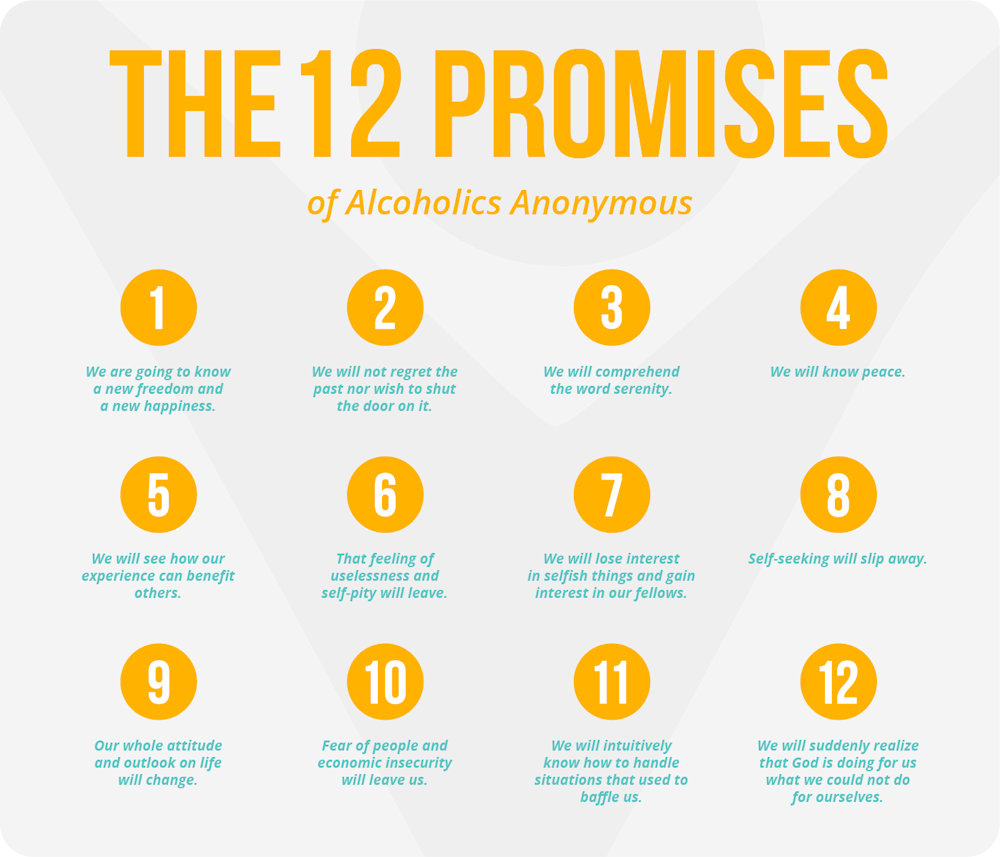In the journey of recovery, the Twelve Promises of AA stand as beacons of hope, guiding individuals towards a fulfilling life. These promises, outlined in AA’s Big Book, provide a glimpse into the profound transformations achievable through the Twelve Steps.
The Promises paint a picture of the newfound peace, happiness, and freedom that come from embracing the principles of AA. They remind us that recovery is not just about abstaining from alcohol but about rediscovering joy, building healthy relationships, and finding a sense of purpose. This article explores the Promises’ meanings, origins, and their role as guiding lights in the recovery journey. So, let’s explore the wonderful world of the AA Promises together!
What are the Promises of AA?
Jump to Section

The Promises of Alcoholics Anonymous (AA) are a set of assurances found in the Big Book, describing the positive changes members can expect as they work through the Twelve Steps. These promises are outlined on pages 83–84 of the Big Book, in the chapter titled “Into Action.”
Here are the Twelve Promises:
Promise One
We are going to know a new freedom and a new happiness.
Promise Two
We will not regret the past nor wish to shut the door on it.
Promise Three
We will comprehend the word serenity.
Promise Four
We will know peace.
Promise Five
No matter how far down the scale we have gone, we will see how our experience can benefit others.
Promise Six
That feeling of uselessness and self-pity will disappear.
Promise Seven
We will lose interest in selfish things and gain interest in our fellows.
Promise Eight
Self-seeking will slip away.
Promise Nine
Our whole attitude and outlook on life will change.
Promise Ten
Fear of people and economic insecurity will leave us.
Promise Eleven
We will intuitively know how to handle situations that used to baffle us.
Promise Twelve
We will suddenly realize that God is doing for us what we could not do for ourselves.

What Can AA’s Promises Lead To?
The program’s Twelve Steps, when followed with diligence, can lead to profound transformations and benefits that are embodied in Alcoholics Anonymous’s (AA) Twelve Promises.
New Freedom and Happiness
Members will experience a sense of liberation and joy, free from the burdens of addiction and past regrets.
No Regrets of the Past
Members will not feel the need to regret the past, as they will understand that their experiences have contributed to their growth and recovery.
Comprehension of Serenity
Members will find peace and calm, regardless of external circumstances, which is a stark contrast to the turmoil often experienced during active addiction.
Peace
Members will achieve a state of inner tranquility and contentment.
Fear of People and Economic Insecurity Will Disappear
Members will acquire confidence and stability in their lives, free from the fear of people and financial instability.
Intuitively Know How to Handle Situations That Used to Baffle Us
Members will develop a better understanding and intuition for dealing with situations that previously caused confusion and distress.
We Will Suddenly Realize That God Is Doing for Us What We Could Not Do for Ourselves
Members will recognize and appreciate the positive changes in their lives that have come about through a higher power or their newfound sobriety, acknowledging that these changes were beyond their abilities alone.
These promises provide hope and motivation, highlighting the significant improvements in emotional, mental, and spiritual well-being that can come from committing to the AA program. They underscore that recovery is not just about stopping drinking but about transforming one’s life holistically and positively.
Where Did the AA Promises Come From?
The AA Promises were first introduced in the second edition of the Big Book of Alcoholics Anonymous in 1955. Originally known as the “Nine Promises,” they were designed to offer hope and inspiration to individuals in recovery. Over time, additional statements were added, and they are now commonly referred to as the “Twelve Promises.”
Bill W., one of the co-founders of AA, along with the early members, wrote the Big Book collaboratively to provide a clear and hopeful vision of what could be achieved through the program. The inclusion of the AA Promises was intended to illustrate the tangible and emotional benefits of sobriety and working the steps, offering encouragement and hope to those struggling with alcoholism. These promises addressed the need for positive affirmations within the AA community, providing a roadmap for a more positive future for individuals in recovery who often struggle with feelings of hopelessness and despair.
How Can the Promises of AA Help With Your Recovery?
The Promises of AA serve as an encouragement for individuals on the path to recovery from alcoholism.
Inspiration
The Promises inspire individuals engaging with the Twelve Steps of AA by depicting the positive changes possible in relationships, emotional stability, and personal freedom. This visualization encourages belief in a better future and motivates individuals to pursue sobriety with optimism.
Motivation
The Promises highlight the benefits of sobriety, such as inner peace and a renewed sense of purpose, serving as motivation to persevere through the recovery process. They help individuals remain steadfast in their sobriety journey, especially during challenging times.
Guidance
The Promises offer insights into the benefits of adopting AA’s principles, like honesty and humility. This guidance helps individuals handle recovery’s complexities with a clearer sense of direction, moving towards a fulfilling sober life.
Validation
Experiencing the fulfillment of the Promises validates the efforts made in recovery. This validation not only affirms the effectiveness of the Twelve Steps but also boosts confidence and resilience against future challenges.
Encouragement
The Promises act as encouragement during tough times by reminding individuals of their progress and the potential for further growth. This encouragement reinforces the value of facing recovery challenges for a more purposeful life.
Community Support
Discussing the Promises within the AA community builds support and solidarity. Sharing personal experiences of how the Promises have come to fruition offers encouragement and strengthens the resolve to maintain sobriety and contribute to collective recovery efforts.
Why Are the Promises of AA so Important?
The promises of AA play a vital role in the recovery community by offering hope, motivation, and validation. By illustrating the tangible benefits of sobriety, such as improved relationships and emotional stability, they inspire individuals to believe in the possibility of positive change. These promises serve as guiding principles for navigating the complexities of recovery. They reinforce the belief that sobriety is attainable and provide a roadmap for building a fulfilling life free from addiction.
Moreover, the promises validate individuals’ efforts in recovery, fulfill them in their lives, and foster confidence and resilience. This validation empowers perseverance through challenges and growth opportunities, aiding the journey toward lasting sobriety and well-being.
What is the Most Popular AA Slogan?
AA features numerous sayings, or slogans, that inspire members to maintain their sobriety. One of the most popular slogans used in Alcoholics Anonymous (AA) is “One day at a time.” This phrase encapsulates the approach of focusing on living in the present moment and tackling sobriety one day at a time, rather than feeling overwhelmed by the prospect of lifelong abstinence. This slogan helps members deal with recovery challenges by breaking them down into more manageable, daily steps.
Another popular slogan used is “Keep it simple.” This slogan encourages members to avoid overcomplicating recovery and focus on sobriety basics. It reminds people to not get overwhelmed by the bigger picture, making the recovery process more approachable and less daunting.
We also have the well-known slogan “Keep coming back.” This phrase underscores the importance of consistent participation in AA meetings and the recovery community. It serves as a reminder that recovery is an ongoing journey that requires continuous effort and support. “Keep coming back” encourages individuals to remain engaged in the fellowship, seek guidance when needed, and stay connected with others who understand their struggles.
Where Can You Learn the Promises of AA?

You can learn about the promises of Alcoholics Anonymous (AA) from several sources:
AA Literature
The promises are famously in the AA “Big Book,” specifically Chapter 6, “Into Action.” The promises detail the benefits that can come from working the Twelve Steps of AA.
AA Meetings
Attending AA meetings is another way to learn about the promises. These are often shared by members who talk about how the promises have manifested in their recovery.
AA Websites
The official AA website and affiliated sites offer resources and information about the promises.
Sponsorship
In AA, a more experienced member, known as a sponsor, helps newer members. Sponsors can explain the promises and how they relate to the steps and recovery.
AA Related Books and Publications
Many publications detail the Twelve Steps and Promises, available in bookstores or libraries.
Engaging with these addiction resources deepens understanding of AA’s promises and their role in the recovery process.
Embrace the AA Promises Through the Twelve Steps
Discover the transformative power of the AA Promises by engaging with the Twelve Steps of Alcoholics Anonymous. These promises offer hope and a vision of recovery that can radically change your life. If alcohol addiction is affecting you or someone you know, begin the journey to recovery today. Contact us to learn about how these promises can lead to a fulfilling, sober life. Remember, recovery is within reach, and the AA Promises show just how rewarding it can be. Don’t wait—start your journey toward healing and renewal today.

Dr. Richard Crabbe joined our team in 2019 as our psychiatrist and medical director. He attended the University of Ghana Medical School where he became a Medical Doctor in 1977. From 1978 through 1984, he was a medical officer in the Ghana Navy and provided a variety of services from general medicine to surgeries. He received his Certificate in General Psychology from the American Board of Psychology and Neurology in 2002.

 May 24th, 2024
May 24th, 2024










